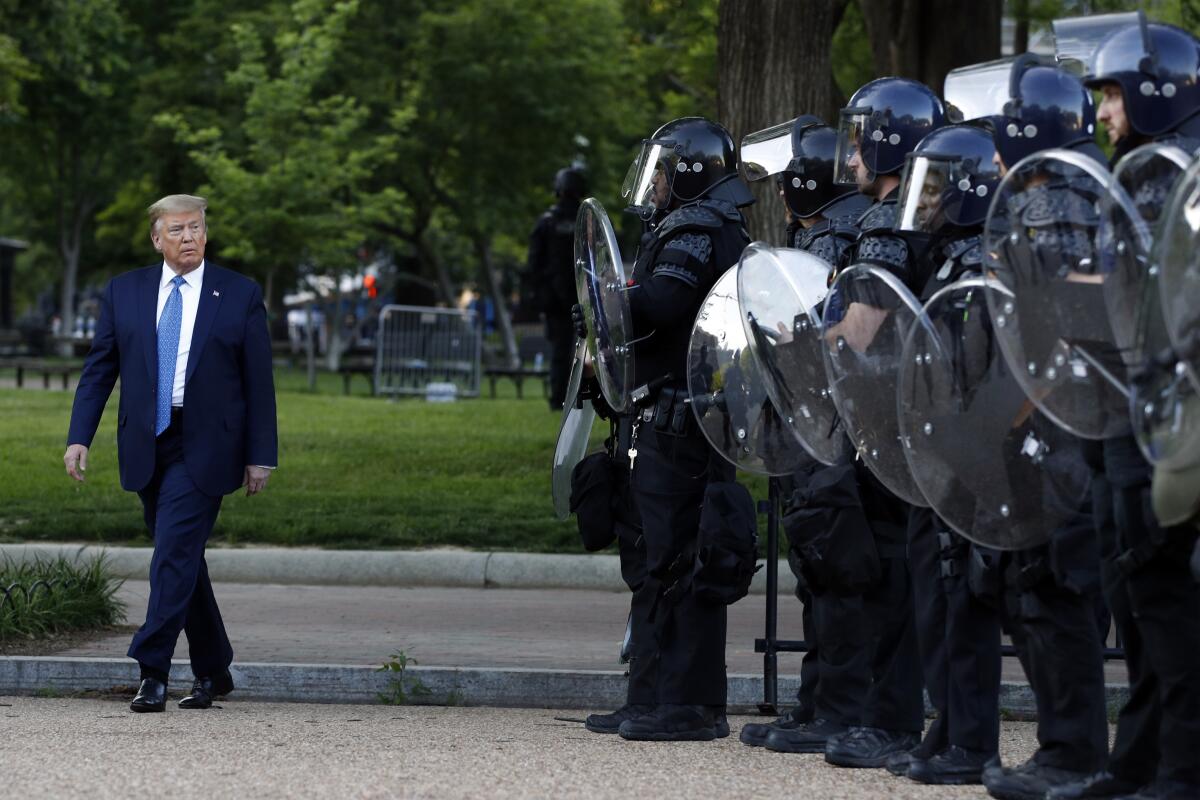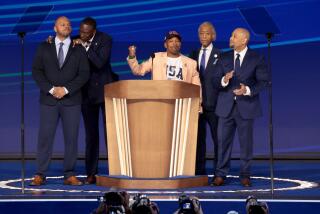Op-Ed: What the five living presidents say about the protests

- Share via
As protests against police brutality and systemic racism continued across the nation last week, President Trump and all the living former presidents weighed in with their thoughts. Here are edited excerpts from statements made by Jimmy Carter, Bill Clinton, George W. Bush, Barack Obama and Donald Trump in the last week.
Jimmy Carter, in a statement posted Wednesday:
People of power, privilege, and moral conscience must stand up and say “no more” to a racially discriminatory police and justice system, immoral economic disparities between whites and blacks, and government actions that undermine our unified democracy. We are responsible for creating a world of peace and equality for ourselves and future generations. We need a government as good as its people, and we are better than this.
Bill Clinton, in a statement posted on May 30:
No one deserves to die the way George Floyd did. And the truth is, if you’re white in America, the chances are you won’t. That truth is what underlies the pain and the anger that so many are feeling and expressing — that the path of an entire life can be measured and devalued by the color of one’s skin.
George W. Bush, in a statement posted Tuesday:
The doctrine and habits of racial superiority, which once nearly split our country, still threaten our Union. The answers to American problems are found by living up to American ideals — to the fundamental truth that all human beings are created equal and endowed by God with certain rights. We have often underestimated how radical that quest really is, and how our cherished principles challenge systems of intended or assumed injustice.
Barack Obama, in a digital town hall Wednesday:
The bottom line is, I’ve been hearing a little bit of chatter on the internet about voting versus protest. Politics and participation versus civil disobedience and direct action. This is not an either/or. This is a both/and. To bring about real change, we both have to highlight a problem and make people in power uncomfortable, but we also have to translate that into practical solutions and laws that can be implemented.
I have to tell you, although I was very young when you had riots and protests and assassinations and discord back in the ‘60s, I know enough about that history to say, this is something different. You look at [current] protests, and that is a far more representative cross-section of America out on the streets, peacefully protesting, who felt moved to do something because of the injustices that they had seen. That didn’t exist back in the 1960s, that kind of broad coalition. The fact that recent surveys have shown that, despite some protests having been marred by the actions of some, a tiny minority that engaged in violence — and as usual, that got a lot of attention, a lot of focus — that despite all that, a majority of Americans still think those protests were justified. That wouldn’t have existed 30, 40, 50 years ago. There is a change in mindset that’s taking place.
Donald Trump, in a speech Monday:
These are not acts of peaceful protest. These are acts of domestic terror. The destruction of innocent life and the spilling of innocent blood is an offense to humanity and a crime against God. America needs creation, not destruction. Cooperation, not contempt; security, not anarchy. Healing the hatred; justice, not chaos. This is our mission, and we will succeed 100%. We will succeed. Our country always wins.
… and in White House remarks celebrating employment gains on Friday:
Equal justice under the law must mean that every American receives equal treatment in every encounter with law enforcement regardless of race, color, gender or creed. They have to receive fair treatment from law enforcement. … We all saw what happened last week. We can’t let that happen. Hopefully George is looking down right now and saying this is a great thing that’s happening for our country. This is a great day for him. It’s a great day for everybody. This is a great, great day in terms of equality.
Compiled by Mariah Kreutter
More to Read
A cure for the common opinion
Get thought-provoking perspectives with our weekly newsletter.
You may occasionally receive promotional content from the Los Angeles Times.










